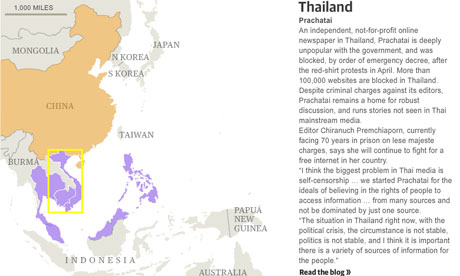Thursday 21 October 2010 | guardian.co.uk | Ben Doherty in Bangkok
Vietnam, Burma, Thailand, Cambodia and the Philippines are all moving towards Chinese-style internet censorship
• Interactive guide: censorship in Asia
• Interactive guide: censorship in Asia
Governments across south-east Asia are following China's authoritarian censorship of the digital world to keep political dissent in check, the Guardian can reveal.
Vietnam, Burma, Thailand, Cambodia and the Philippines have all moved or are moving towards monitoring internet use, blocking international sites regarded as critical and ruthlessly silencing web dissidents.
• In Vietnam, the Communist party wants to be your "friend" on the state-run version of Facebook, provided you are willing to share all personal details.
• In Burma, political unrest can be silenced by cutting off the country from the internet.
• In Thailand, website moderators can face decades in jail for a posted comment they did not even write, if the government deems it injurious tothe monarchy.
While much is made of China's authoritarian attitudetowards internet access, a majority of south-east Asian governments have similar controls and , rather than relaxing restrictions on internet use, many are moving towards tighter regulation.
The Guardian has spoken to five leading bloggers across the region about the present restrictions they face and future fears.
Raymond Palatino, a Filipino MP and editor with Global Voices, says governments, in addition to crudely blocking websites, are starting to use arguments of morality and decency to censor access to information and quash criticism.
"There is direct censorship to block political dissent. You have repressive laws in Myanmar [Burma], in Vietnam, in Singapore. In fact I think Vietnam is catching up with China in terms of building strong firewalls to prevent dissidents from accessing critical content on the internet.
"But we also see governments using the excuse of protecting the public morality in order to censor internet content. Governments use the excuse of censoring pornography as a safe argument to make censorship acceptable to the public."
More than a decade ago, George W Bush asked people to "imagine if the internet took hold in China. Imagine how freedom would spread". But rather than emerging as a catalyst for democracy, the internet has become another way to to stifle dissent.
 |
| Interactive: Meet five key bloggers who fear a crackdown on freedom of expression. |
[ ... Read the full article here ... ]








Aucun commentaire:
Enregistrer un commentaire